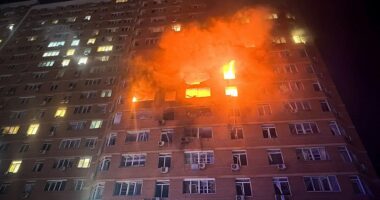AN award-winning actress is fighting to stop an HOA plan to shut down roads in her neighborhood in a bizarre effort to keep out crime.
Madeleine Stowe and her husband, actor Brian Benben, have butted heads with neighbors since moving into their deluxe community in Memphis, Tennessee.


“By what right do they have to make this?” Stowe told NBC affiliate WMC.
“These are your streets. They’re my streets. The taxpayers have paid for them.”
A war is underway in one of Memphis’s most enviable neighborhoods, Chickasaw Gardens, and Stowe is on the frontline.
The Last of the Mohicans star is fighting her HOA board’s wishes to close their neighborhood’s entrances in an effort to keep criminals out.
In the application, the board argues that limited entrances would “allow security to monitor the activity in the neighborhood going in and out.”
However, critics of the plan believe the move could deter Memphis locals from enjoying a public park that lies in the middle of the neighborhood.
Stowe has argued that the change is a disguised effort to turn the neighborhood into a gated community.
She and her husband have hired a lawyer to represent other residents who aren’t on board with restricted access.
In her interview, Stowe boldly proclaimed that her neighborhood streets belong to the entirety of Memphis.
She said she’s speaking up for residents who use the public park but don’t have the time to appeal to the city council.
The famous Short Cuts star believes that only people who are wealthy and influential have the ability to attend city council meetings whenever they please.
In November 2023, the Memphis Land Use Control Board denied the HOA’s request to close off the neighborhood’s two most popular access points.
City officials wrote the extreme solution was “not a sustainable remedy for crime prevention.”
However, the board continues to press the issue and reintroduce plans to lawmakers.
What is an HOA?

One in five Americans live in an area with a Homeowners’ Association – or HOA. But what exactly is it that they do?
- An HOA is a homeowner’s association – an organization that aims to maintain a clean and cohesive place to live for its residents.
- Entire neighborhoods, subdivisions, condominiums, family homes, or townhouses within “a planned development” will often make up an HOA.
- They also act as a governing body for tenants, who run and fund the HOA through monthly fees.
- Their principal aims are to keep the community functioning and visually appealing and to maintain property values.
- They primarily focus on common areas of a neighborhood, such as roads, parks, and pools – but may also stipulate what residents can do with their properties, such as yards and driveways.
- Often these restrictions enforce uniformity on properties, for example, ensuring most houses look the same and all driveways are clear of weeds.
- An HOA rulebook of covenants, conditions, and restrictions (CC&R) is distributed to all residents, and an elected volunteer board of directors enforces these regulations.
- Breaking these rules can result in penalties such as fines and even litigation – as most HOAs are incorporated and subject to state law.
- HOAs are often the subject of controversy, with some members feeling that the rules are too punitive and restricting, or that the leadership has too much power.
- But others like that HOAs give communities the power of self-governance, and can ensure a degree of harmony between residents.
Around the time the plan was first introduced, other neighborhood residents didn’t feel comfortable with the idea.
“We need to be addressing the fact that we have a crime problem, and it’s not being dealt with effectively,” resident Sarah Smith said in 2023.
“Why are we dealing with crime in Memphis by closing people out?”
Now, Stowe hopes to represent residents like Smith alongside legal counsel.
She and her lawyer planned to present research at a meeting on Tuesday that refutes the idea that the proposed gates would lower neighborhood crime.
The U.S. Sun has reached out to Chickasaw Gardens for comment.
The HOA drama comes after another homeowner was fined $13,000 for storm damage – despite the fact that it came two years before he bought his house.

















